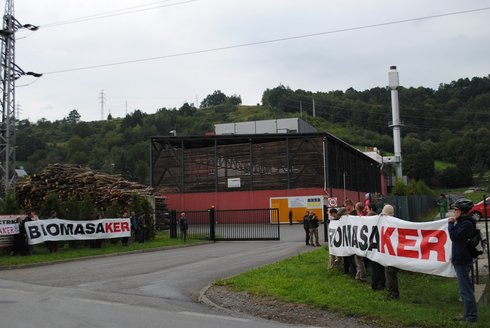Neudržateľné decimovanie lesov kvôli drevnej štiepke
Black Book of Bioenergy uvádza, že spaľovanie biomasy vytvára emisie skleníkových plynov a vedie k masívnemu úbytku biodiverzity a deštrukcii ekosystémov. Prípadová štúdia o Slovensku uvádza, že výroba energie z dreva vzrástla za posledných deväť rokov o 72 %. „V polovici deväťdesiatych rokov na Slovensku ťažili maximálne 5,5 milióna m3 dreva, v súčasnosti až 10 miliónov kubíkov ročne. A 5,5 milióna kubíkov bolo maximum, ak chceme zachovať lesy ako tak funkčné“ hovorí ekológ Ján Topercer.
Lesoochranárske zoskupenie VLK dlhodobo upozorňuje na zvyšovanie výrubov. Cieľom kampane je zrušenie štátnych dotácií na drevo spaľované v biomasových zariadeniach, okrem dreva pochádzajúceho z energetických porastov a z odpadu z drevospracujúceho priemyslu. Dôvodom je fakt, že na Slovensku ubudlo za posledných pätnásť rokov 760 km2 lesov a v súčasnej dobe sa ťaží takmer 4 milióny m3 dreva na energetické účely, pričom udržateľná ťažba všetkého dreva na lesných a nelesných plochách by mala byť maximálne do 6 miliónov kubíkov.
Napríklad, firma Bioenergy Bardejov ročne spáli 100-tisíc m3 dreva a od štátu dostáva dotáciu 5,5 milióna eur. Úrad pre reguláciu sieťových odvetví koncom roka 2016 potvrdil, že 18 tisíc m3 dreva nespĺňalo podmienky na udelenie tejto dotácie. Až 85% všetkých kontrolovaných skladových zásob dreva v spaľovni, konkrétne 12 650 ton patrilo do vyšších kvalitatívnych tried ako zákonom predpísanej triedy č. VI. To znamená, že 18 % z pridelenej dotácie bolo vyplatených v rozpore so zákonom.
Využívanie štiepky na výrobu energie je jedným z najväčších omylov pri presadzovaní výroby energie z biomasy v EÚ, konštatoval Peter Sabo z VLK s tým, že na Slovensku štát od roku 2009 výrobu elektriny z drevnej štiepky dotuje viacerými spôsobmi. Takto vyrobená energia sa dostáva do siete prednostne a finančná dotácia výrobcom pokrýva náklady na nákup suroviny. Každá firma má drevnú štiepku zadarmo a má garantované, že všetko, čo vyrobí, aj predá. Štát nedisponuje analýzou, ktorá by posúdila množstvo disponibilného dreva. To vedie k tomu, že štát podporuje budovanie nových spaľovní, ktoré svojou spotrebou už v roku 2013 prekročili kapacity slovenských lesov. Výsledkom je umelé zvýšenie spotreby dreva o 1,5 milióna m3 ročne.
Dôsledky sú alarmujúce. Došlo k zvýšeniu ťažby z lesov a ťaží sa aj na miestach, ktoré dovtedy ostávali nedotknuté: brehové porasty, remízky, vetrolamy. Ďalším dôsledkom je aj presadzovanie ťažby dreva do chránených území s vyšším stupňom ochrany. Prichádzame o najcennejšie lokality, ktoré poskytovali miesto pre odpočinok a úkryt pre zver a tvorili kostru, ktorá stabilizovala krajinu.
VLK, spolu s 38 000 občanmi ktorí podpísali petíciu, od roku 2014 žiada príslušné ministerstvá, aby zrušili dotácie na výrobu energie zo štiepky. Vypracovali analýzu využívania dreva na energetické účely, no napriek jej zverejneniu štát naďalej podporuje výstavbu nových spaľovní.
Minister hospodárstva SR nedávno predložil návrh na zmenu zákona o obnoviteľných zdrojoch energie tak, aby bolo možné podporovať výrobu bioetanolu aj z dreva. Pre lesy tak naplánoval ďalší tvrdý zásah v podobe nového, umelo vyvolaného dopytu. Občania zaplatia zisk firmám v podobe dotácií a straty za poškodenie životného prostredia bude znášať celá spoločnosť. VLK preto žiada v hromadnej pripomienke, aby drevná biomasa nebola považovaná za surovinu na výrobu biopaliva.
Location
Slovensko, Prešovský kraj, okres Bardejov, Bardejov
Environmental impact
- Land degradation (e.g. drought, soil contamination, erosion and desertification)
- Biodiversity loss – Ecosystem destruction
- Depletion of natural resources (fossil and mineral, forest, water, etc)
- Alteration of landscape aesthetics and built heritage
Ethical/ legal issues
- Health and well-being
- A clean and prosperous environment and a safe and pleasant habitat
- Opportunities to work and leisure
- Access to public goods/ resources and products
- Education and information
- Democratic participation to decision-making on community and national affairs
Information sources & materials
Scientific/ academic reports
http://biomasaker.wolf.sk/files/Analyza_biomasa_skratena_april_2014.pdf
http://www.birdlife.org/europe-and-central-asia/black-book
Online books and newspaper, magazine, encyclopedia, or blog articles
http://venergetike.sk/ochranarom-sa-nepaci-vyroba-energii-drevnej-stiepky/
https://aktualne.atlas.sk/slovensko/spolocnost/rizika-zelenej-energie-zo-statnych-dotacii-stal-obchod-zatial-co-lesov-ubuda.html
https://annazemanova.blog.sme.sk/c/423630/biomasaker-dva-riadky-v-zakone.html
Contributor(s)
Štefan Szabó, Silvia Szabóová, SOSNA Association, Slovakia



Home › Forums › Unsustainable decimation of forests due to wood chipping